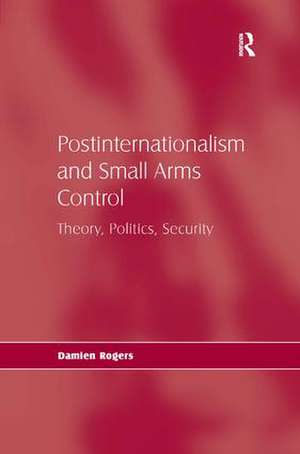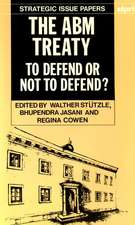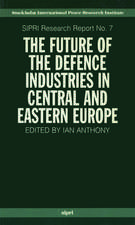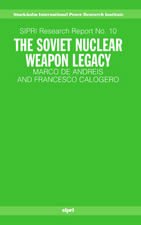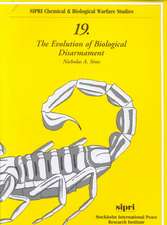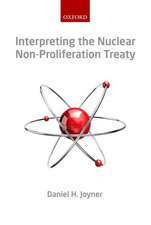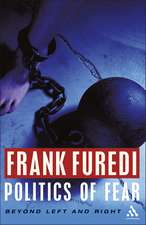Postinternationalism and Small Arms Control: Theory, Politics, Security
Autor Damien Rogersen Limba Engleză Hardback – 28 mai 2009
Preț: 1008.17 lei
Preț vechi: 1229.48 lei
-18% Nou
Puncte Express: 1512
Preț estimativ în valută:
192.94€ • 209.50$ • 162.07£
192.94€ • 209.50$ • 162.07£
Carte tipărită la comandă
Livrare economică 22 aprilie-06 mai
Preluare comenzi: 021 569.72.76
Specificații
ISBN-13: 9780754675389
ISBN-10: 0754675386
Pagini: 300
Dimensiuni: 156 x 234 x 18 mm
Greutate: 0.68 kg
Ediția:1
Editura: Taylor & Francis
Colecția Routledge
Locul publicării:Oxford, United Kingdom
ISBN-10: 0754675386
Pagini: 300
Dimensiuni: 156 x 234 x 18 mm
Greutate: 0.68 kg
Ediția:1
Editura: Taylor & Francis
Colecția Routledge
Locul publicării:Oxford, United Kingdom
Recenzii
'By any reckoning the trade in small arms is big business. And it is here that this generally informed and comprehensive study by Damien Rogers takes aim. It is his thesis that existing governance and state-based systems, by their sanctioning and promotion of what is regarded as legitimate dealing in small arms, comprise the major roadblocks impeding effective or comprehensive solution to this cancer spreading violence and mayhem.' New Zealand International Review '...provides a cogent exploration of the fundamental flaws and misconceptions in global efforts to curtail the small arms trade that urges the international community - states, the UN, NGOs, activists and academics alike - to rethink one of the most pressing and daunting challenges in international affairs.' Kim Huynh, Australian National University, Australia 'A thought-provoking study of the scope and limits of efforts to curb the effects of small arms and light weapons proliferation and misuse. This study's vision of the evolving structure of global politics also provides lessons for a range of progressive initiatives in a complex multilateral and multi-actor world.' Keith Krause, Graduate Institute of International and Development Studies, Switzerland 'The need to control an unbridled flow of small arms is gaining international salience. But how might such efforts progress when states, and the political and governance systems within which they operate, are as much the problem as the means to any cure? This lively and informed study tackles that dilemma with alacrity. For concerned analysts and policy makers this study is essential reading.' Roderic Alley, Victoria University of Wellington, New Zealand
Notă biografică
Dr Damien Rogers, Affiliate Scholar of the School of Social Sciences, The Australian National University, Australia.
Cuprins
Introduction; Part I Theory, Politics, and Armed Violence; Chapter 1 Postinternationalism; Chapter 2 Small Arms Impacts; Part II Composing Small Arms Control; Chapter 3 Researchers; Chapter 4 Intergovernmental Organizations; Chapter 5 United Nations Security Council; Chapter 6 Governments; Chapter 7 Civil Society Organizations; Part III Eroding Small Arms Control; Chapter 8 Arms Traders; Chapter 9 Weapons Users; conclusion Conclusion;
Descriere
Damien Rogers examines how the international community has responded to the challenge of controlling small arms and light weapons since the early 1990s. He focuses on the maturing relationships between particular actors of world affairs and identifies how arms brokers and users of these weapons are able to mitigate, resist or elude the intended effects of those responses.
